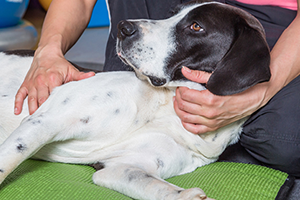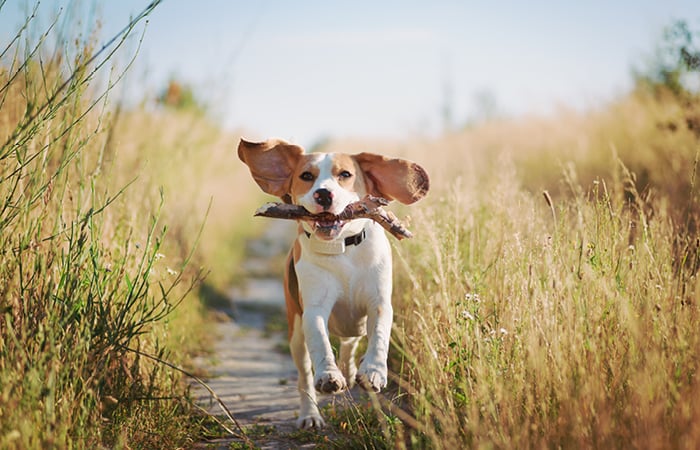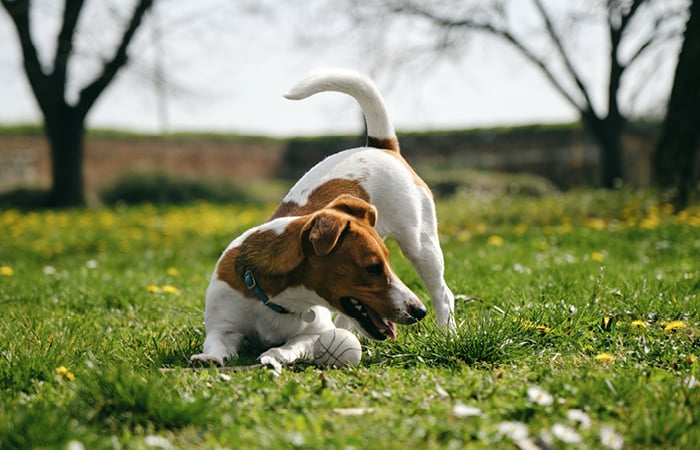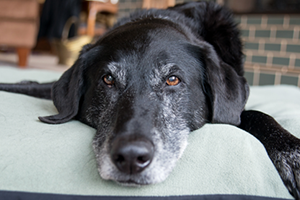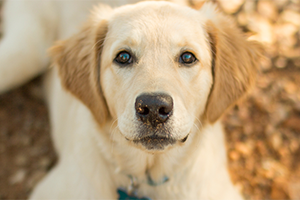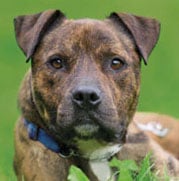
Chow Chow

These teddy bear-like dogs are fiercely loyal with a low-maintenance personality but a high-maintenance grooming regime.
Vital stats
Swipe to view more
| Size: | Large |
| Coat: | Very thick and heavy shedding |
| Exercise | Up to 1 hour daily |
| Life span: | 10 – 15 years |
| Breed group: | Utility |
| Temperament: | Independent, loyal, aloof |
Chow Chow temperament & personality

- Chow Chows are very devoted dog and form incredibly strong bonds with their owners, making them loyal and loving companions.
- With a strong guarding instinct, Chows can be quite wary of strangers so early socialisation is important for this breed.
- Chows make good family pets but aren’t known for their playfulness or patience so they are better suited to families without boisterous younger children.
- As well as being physically strong, Chow Chows can be quite strong-willed and stubborn so they are not the best choice for novice owners.
Chow Chow training & exercise

Training tips
- As they can be wary of others outside their household, socialisation training should be ongoing throughout your dog’s life.
- Dog training should start from an early age to help mould your pup’s behaviour and stop their independent streak taking over.
- A tendency to do their own thing coupled with a strong hunting instinct means that extra attention should be paid to a Chow’s recall and lead training.
- Chows will not respond well to harsh or forceful training methods. The best way to train a Chow is through consistent, positive, reward-based training.
Keeping them happy
- A Chow will be happy and content the more time they can spend with their owner so try and involve them in anything and everything going on around the home.
- Because Chows form such strong bonds with their owners, they can sometimes be prone to separation anxiety if left alone for too long and they will thrive in households where there is usually someone around.
Exercise
- For a large breed of dog, Chows need a relatively low amount of exercise – 40-60 minutes per day is usually enough. This should always include a couple of walks with off-lead playtime in a secure area.
- A Chow’s thick coat means they can get hot very easily. Exercise in the hotter summer months should be taken earlier and later in the day when it’s cooler and more comfortable for your dog.
- Their thick coats also mean that Chows don’t make for good swimmers, so it’s best to keep them away from water.
Game ideas
- Hunting, herding and hide-and-seek games will prove popular with a Chow Chow by tapping in to their hunting instinct.
- A Chow Chow will enjoy the mental and physical stimulation of an agility course. You can try setting one up in a garden or secure outside space with ramps, hurdles, tunnels and balls attached to ropes.
Chow Chow grooming

Chows are known to be a very clean breed – almost cat-like in their approach to personal hygiene. However, because of their high shedding coats, Chows can be particularly high-maintenance when it comes to grooming.
- Chow Chows come with one of two types of coat: rough coat and smooth coat. Rough coated Chows have a thick, coarse, medium-length outer coat covering a softer, woolly undercoat that tends to require regular, daily brushing. Smooth coated Chows have shorter hair that is much easier to maintain. They tend to need brushing around 2 or 3 times a week.
- Chows are a particularly high shedding breed, so any new owner should be prepared for cleaning up hair around their home. Extra care and more brushing will be needed during moulting season (usually spring and autumn) to keep their coats in top condition.
- Their heavy coats can mean they have a tendency to overheat in the summer months so need access to shaded outdoor space to keep cool.
- As well as checking their ears for infections caused by the build-up of wax, take time to check the skin folds that Chows are often known for – particularly around their necks. Make sure these folds are clean and dry to avoid any unwanted skin infections.
Chow Chow nutrition

As with most dogs, Chows will benefit from a balanced diet that follows a consistent routine. Be careful not to overfeed to make sure your dog maintains a healthy weight.
- Historically, Chow Chows have been bred on a largely vegetarian diet and therefore require a low protein, high calcium diet based around grains and vegetables. Meat should still be included, but it should be lean and low in fat – chicken and turkey are good options.
- To help maintain the health of their thick, furry coats, healthy, omega fatty acids (from fish) should also be included in a Chow’s diet.
- Make sure your Chow has an easily accessible supply of fresh water, especially during the hot summer months. This will help avoid overheating and dehydration.
What to know before you buy or rehome a Chow Chow

- By forming an incredibly strong bond with their owner, Chow Chows make an ideal choice for anyone looking for a loyal canine companion. But they are better suited to more experienced owners and families without young children.
- Their independent, sometimes aloof nature means they don’t always warm to new people easily. And with a strong guarding instinct, Chows can be very protective and are often wary of strangers. Chow Chow puppies should always be well-socialised from an early age.
- Chows are pretty high-maintenance when it comes to grooming. As a high shedding breed they will leave their hair around a home and rough coated Chows will need daily brushing.
- An independent nature can make training a Chow a bit of a challenge and their training should be ongoing throughout their lives. However, as very intelligent dogs, they have an ability to learn very quickly.
- For a large dog, Chows need a relatively low amount of exercise. Two walks a day with plenty of mental stimulation will keep them happy.
- A strong prey drive and hunting instinct means extra attention should be paid to a Chow’s lead and recall training. Extra care should always be taken when a dog is around wildlife too.
- Always be fussy about the breeder you choose. ‘Lucy’s Law’ dictates that new puppies must be bought directly from a breeder or adopted from rescue. Third party sellers are illegal.
- There are many things to consider before getting a dog. Always find out whether a canine friend is the best pet for you before you make the leap from dog lover to dog owner.
Chow Chow frequently asked questions
Discover some of the most popular dog breeds
Chow Chow insurance considerations
We always offer these things as standard:
Physiotherapy & pet therapies
Along with physiotherapy, which is covered within the Vet Bills benefit, we also cover Pet Therapies like herbal medicine, homeopathy and acupuncture. You can also claim for hydrotherapy, up to £500 per illness/injury in dogs and cats (no additional limit for rabbits).
Petplan is a trading name of Pet Plan Limited (Registered in England No. 1282939) and Allianz Insurance plc (Registered in England No. 84638), Registered office: 57 Ladymead, Guildford, Surrey GU1 1DB.
Pet Plan Limited is authorised and regulated by the Financial Conduct Authority. Financial Services Register No. 311969. Allianz Insurance plc is authorised by the Prudential Regulation Authority and regulated by the Financial Conduct Authority and the Prudential Regulation Authority. Financial Services Register No. 121849. Pet Plan Limited is a subsidiary of Allianz Insurance plc.



































